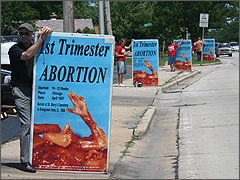
You know how sometimes you read something, then you have to read it again, and then yet again before you think you understand the author?
No, I wasn’t trying to read G.K. Chesterton’s Orthodoxy (yet again) or Pope Benedict’s latest encyclical (which I’m determined to get through—but that’s another story).
Parker’s Mixed Up Logic
This time I was reading an opinion column in the Daily Herald by Kathleen Parker, titled “Abortion’s Route to Rare.”
There are some particularly mixed up parts of her column, such as:
My own view, both pro-life and pro-choice, has been that abortion truthfully presented would eliminate itself, or vastly reduce its numbers.
She’s one of those people who seems to believe that abortion is murder (based on the overall feeling I get from her column) but thinks that we should continue to let women murder their babies if they want to.
Such sentiments have never made sense to me. If something is murder, that’s bad and it should be stopped. Shouldn’t it? At least if a person denies that abortion is murder (and that the unborn human is a person), they are logically consistent in believing there is no need to decrease abortion.
I do agree that education is key to reducing abortion, though, and that is what our activism here at the League focuses on.
The next sentence Parker writes is equally mind-boggling:
Once a pregnancy is viewed as a human life in formation, rather than a “blob of cells,” it is less easy to terminate the contents of one’s vessel.
The word choice in this sentence simply puzzles me. The unborn baby isn’t itself “a pregnancy.” Rather, pregnancy is the period of time the woman carries a person “in formation” within herself.
But stranger yet: what woman refers to her womb as “one’s vessel”?
The Value of Informed Consent
Parker makes some sound points about the value of informed consent and laws that require women have the opportunity to view their ultrasounds.
But then she again throws me for a curve:
Well, enough of that. We all know what abortion is and, thanks to some of the sign-toting anti-abortion protesters—who do their cause no good—we know what abortion looks like. Shouldn’t pregnant women also know what their healthy fetus looks like before they hit delete?
The flippancy Parker uses here—referring to the murder of an unborn child as “hit[ting] delete” is sickening. It is particularly so since she has already acknowledged the value of the unborn child in the preceding paragraphs.
But she also snubs pro-life activists who show graphic images of unborn babies, as if we are less important than those who pass legislation in the battle to save lives. Or as if we are hurting the pro-life cause by showing the unborn babies who have died from abortion.
Letter To The Editor
So, to counteract Parker’s devaluing of activism, I wrote a letter to the editor and sent it to a dozen newspapers that printed her column, all across the country.
With any luck, you’ll see the following letter appearing in response in one or more of the newspapers (only one has called to confirm my letter so far but I hope there will be more!):
Kathleen Parker’s column (“Abortion’s Route To Rare,” 5/3/10), states “thanks to some of the sign-toting anti-abortion protesters—who do their cause no good—we know what abortion looks like.”
I disagree. As a staff member of the Pro-Life Action League—an organization that specializes in teaching people what abortion does to unborn children by showing graphic photos of those tortured children—I see a blatant contradiction in what Parker says.
She says these photos “do [our] cause no good,” yet she acknowledges that these signs guarantee that people “know what abortion looks like.” That is the point of these signs, thus we have succeeded.
But we also know of many children who are alive now because their mothers saw what their unborn children looked like and canceled their abortion appointments. That, too, shows that what we do for the cause (preventing abortion) is good. When we educate people about what abortion does to the unborn child—and thereby save lives—we have done our cause much good!
Whether it is through informed consent legislation that tells women about the risks of undergoing an abortion or encourages them to view the ultrasound image or whether it is through seeing pictures of unborn babies torn apart by abortion, education about what abortion really does is the key to making abortion not simply rare, but unthinkable.
There’s only so much a person can say in 200-300 words. But if you’d like to contact Parker to discuss her mixed up logic, you can e-mail her here. I hope if you do, that you’ll post a comment here to share with us what you wrote!
